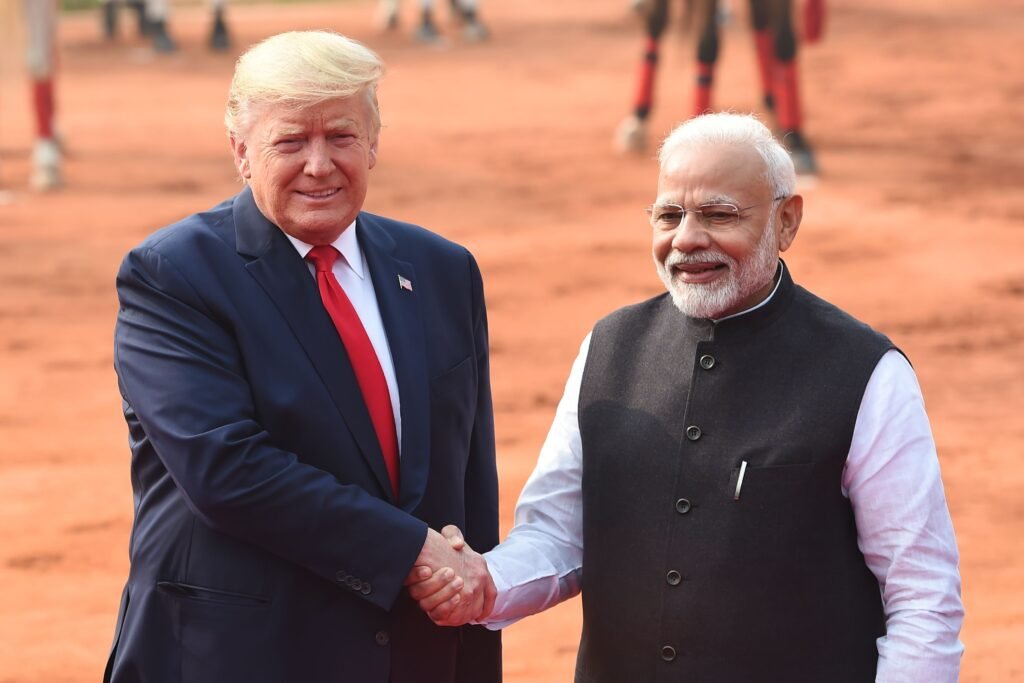The Trump Shock
The reascension of President Donald Trump to the helm of the United States has precipitated a series of economic reverberations, notably impacting India’s financial markets. The imposition of tariffs and the promulgation of protectionist trade policies have engendered a palpable sense of trepidation among investors, culminating in discernible fluctuations within the Indian stock market. In a recent sequence of trading sessions, India’s benchmark indices have exhibited a downward trajectory. The Nifty 50 index experienced a decrement of 0.12%, concluding at 23,045.25, while the BSE Sensex witnessed a decline of 0.16%, settling at 76,171.08. This downturn signifies an aggregate diminution of approximately 3% over a span of six sessions. Not to forget, the aggregate market capitalisation of companies listed on the Bombay Stock Exchange (BSE) contracted by a staggering ₹9.3 lakh crore, settling in at ₹408.52 lakh crore. Concurrently, small-cap stocks have approached bear market territory, descending 21.4% below their historical zeniths, and the mid-cap index has retracted by 17% from its apex. These perturbations are largely attributable to apprehensions surrounding U.S. tariffs imposed on India and substantial divestments by foreign investors. The promulgation of tariffs by the U.S. administration has ostensibly catalysed an exodus of Foreign Institutional Investors (FIIs) from the Indian markets. Factors such as a fortifying U.S. dollar, elevated U.S. bond yields, and the overarching ‘America First’ doctrine have collectively impelled FIIs to reallocate their capital. This capital flight has exerted downward pressure on Indian equities, further compounding the prevailing market downturn. The ramifications of President Trump’s policies manifest heterogeneously across various sectors of the Indian economy. The IT and Pharmaceutical sectors, with a substantial reliance on exports to the U.S., confront potential adversities stemming from heightened tariffs and stringent immigration policies. The imposition of elevated tariffs could erode the competitive pricing advantage of Indian IT and pharmaceutical firms in the U.S. market. Moreover, restrictive immigration reforms may impede the mobility of skilled professionals, thereby inflating operational costs for IT enterprises. The U.S. administration’s inclination towards fossil fuels, coupled with prospective tariffs on wind turbines and solar panels, poses hurdles for India’s rising renewable energy sector. Indian companies engaged in green energy initiatives may encounter escalated costs for technology and raw material imports, potentially stymieing the momentum of sustainable energy projects. The imposition of a 25% tariff on steel and aluminum imports by the U.S. has precipitated a 3% decline in India’s metals index. Prominent entities such as Tata Steel and JSW Steel have borne the brunt of this policy, registering significant stock devaluations. Amidst the prevailing economic uncertainties, India’s retail inflation has exhibited a decrement, descending to 4.31%. This development offers a modicum of respite, potentially augmenting consumer purchasing power and creating economic stability. Nevertheless, the overarching apprehensions pertaining to U.S. trade policies continue to cast a shadow over the economic outlook. In response to these multifaceted challenges, it is imperative for India to recalibrate its economic and diplomatic strategies. PM Modi’s just commenced engagements in the US, particularly with President Trump presents a timely opportunity to negotiate trade terms, mitigate tariff-related adversities, and fortify bilateral economic ties. Also, diversifying export markets beyond the U.S. and reinforcing domestic consumption could serve as viable avenues to insulate the Indian economy from external shocks. The resurgence of President Trump’s administration heralds a complex interplay of challenges and opportunities for India’s stock market. A nuanced understanding of these dynamics, coupled with agile policy responses, will be instrumental in navigating the evolving economic landscape.
